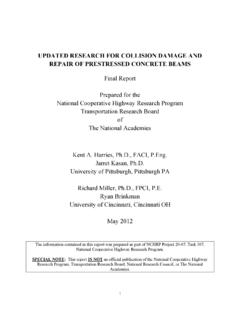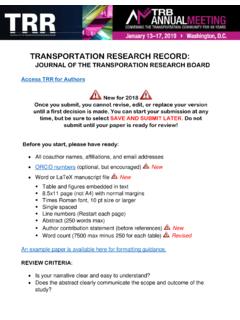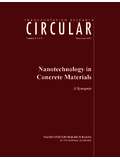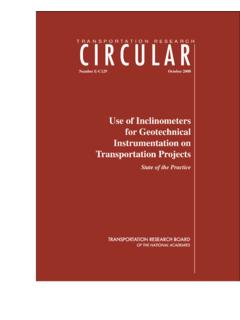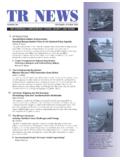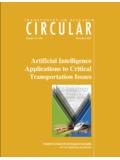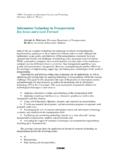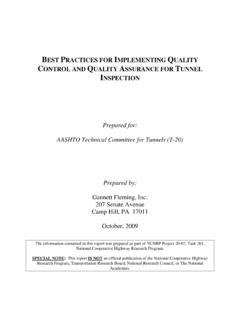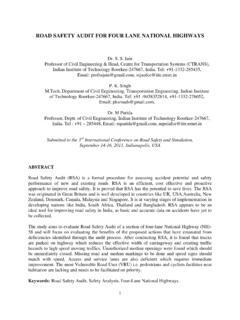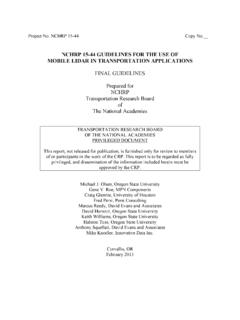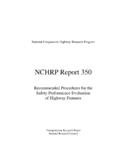Transcription of TCRP Report 70 - Guidebook for Change and Innovation at ...
1 TRANSPORTATION research BOARD Guidebook for Change andInnovation at Rural andSmall Urban transit SystemsTRANSIT COOPERATIVERESEARCHPROGRAMTCRP Report 70 Sponsored by the Federal transit AdministrationNATIONAL research COUNCILTCRP OVERSIGHT AND PROJECTSELECTION COMMITTEECHAIRLINDA S. WATSON Corpus Christi RTAMEMBERSDANNY ALVAREZ Miami-Dade transit AgencyKAREN ANTIONK aren Antion ConsultingGORDON AOYAGIM ontgomery County GovernmentJEAN PAUL BAILLYU nion Internationale des Transports PublicsJ. BARRY BARKERT ransit Authority of River CityLEE BARNESB arwood, L. BARNESC entral Ohio transit AuthorityGERALD L. BLAIRI ndiana County transit AuthorityANDREW BONDS, Transportation Group, L. DORNFTACONSTANCE GARBERYork County Community Action M. GILLIAMC hance Coach, GREENES haron Greene & AssociatesKATHERINE M.
2 HUNTER-ZAWORSKIO regon State UniversityROBERT H. IRWINB ritish Columbia TransitJOYCE HOBSON JOHNSONN orth Carolina A&T State UniversityCELIA G. KUPERSMITHG olden Gate Bridge, Highway andTransportation DistrictPAUL J. LARROUSSEN ational transit Institute DAVID A. LEEC onnecticut TransitSTEPHANIE L. PINSONG ilbert Tweed Associates, H. PRINCE, Bay Transportation AuthorityRICHARD J. SIMONETTAPB ConsultPAUL P. SKOUTELAS Port Authority of Allegheny CountyPAUL A. TOLIVERKing County MetroAMY YORKA malgamated transit UnionEX OFFICIO MEMBERSWILLIAM W. MILLARAPTAMARY E. PETERSFHWAJOHN C. HORSLEYAASHTOROBERT E. SKINNER, EXECUTIVE DIRECTORLOUIS SANDERSAPTASECRETARYROBERT J. REILLYTRBTRANSPORTATION research BOARD EXECUTIVE COMMITTEE 2001 OFFICERSC hair:John M. Samuels, Senior VP-Operations Planning & Support, Norfolk Southern Corporation, Norfolk, VAVice Chair:E.
3 Dean Carlson, Secretary of Transportation, Kansas DOTE xecutive Director:Robert E. Skinner, Jr., Transportation research Board MEMBERSWILLIAM D. ANKNER,Director, Rhode Island DOTTHOMAS F. BARRY, JR., Secretary of Transportation, Florida DOTJACK E. BUFFINGTON, Associate Director and research Professor, Mack-Blackwell National RuralTransportation Study Center, University of ArkansasSARAH C. CAMPBELL, President, TransManagement, Inc., Washington, DCJOANNE F. CASEY, President, Intermodal Association of North AmericaJAMES C. CODELL III, Secretary, Kentucky Transportation CabinetJOHN L. CRAIG, Director, Nebraska Department of RoadsROBERT A. FROSCH, Sr. research Fellow, John F. Kennedy School of Government, Harvard UniversityGORMAN GILBERT, Director, Oklahoma Transportation Center, Oklahoma State UniversityGENEVIEVE GIULIANO, Professor, School of Policy, Planning, and Development, USC, Los AngelesLESTER A.
4 HOEL, L. A. Lacy Distinguished Professor, Depart. of Civil Engineering, University of VirginiaH. THOMAS KORNEGAY, Exec. Dir., Port of Houston AuthorityBRADLEY L. MALLORY, Secretary of Transportation, Pennsylvania DOTMICHAEL D. MEYER, Professor, School of Civil and Environmental Engineering, Georgia Institute of TechnologyJEFF P. MORALES, Director of Transportation, California DOTJEFFREY R. MORELAND, Exec. VP-Law and Chief of Staff, Burlington Northern Santa Fe Corp., Fort Worth, TXJOHN P. POORMAN, Staff Director, Capital District Transportation Committee, Albany, NYCATHERINE L. ROSS, Executive Director, Georgia Regional Transportation AgencyWAYNE SHACKELFORD, Senior VP, Gresham Smith & Partners, Alpharetta, GAPAUL P. SKOUTELAS, CEO, Port Authority of Allegheny County, Pittsburgh, PAMICHAEL S. TOWNES, Exec. Dir., Transportation District Commission of Hampton Roads, Hampton, VAMARTIN WACHS, Director, Institute of Transportation Studies, University of California at BerkeleyMICHAEL W.
5 WICKHAM, Chairman and CEO, Roadway Express, Inc., Akron, OHJAMES A. WILDING,President and CEO, Metropolitan Washington Airports AuthorityM. GORDON WOLMAN, Prof. of Geography and Environmental Engineering, The Johns Hopkins UniversityEX OFFICIO MEMBERSMIKE ACOTT, President, National Asphalt Pavement Association BRUCE J. CARLTON, Acting Deputy Administrator, Maritime Administration, M. CLAPP, Federal Motor Carrier Safety Administrator, M. COUGHLIN, Director and COO, The American Trucking Associations Foundation, L. DORN, Federal transit Administrator, ELLEN G. ENGLEMAN, research and Special programs Administrator, B. FLOWERS (Lt. Gen., Army), Chief of Engineers and Commander, Army Corps ofEngineersHAROLD K. FORSEN, Foreign Secretary, National Academy of EngineeringJANE F. GARVEY, Federal Aviation Administrator, J.
6 GROSS, Deputy Assistant Secretary, Office of Transportation Technologies, DOEEDWARD R. HAMBERGER, President and CEO, Association of American RailroadsJOHN C. HORSLEY, Exec. Dir., American Association of State Highway and Transportation OfficialsMICHAEL P. JACKSON, Deputy Secretary of Transportation, M. LOY (Adm., Coast Guard), Commandant, Coast GuardWILLIAM W. MILLAR, President, American Public Transportation AssociationMARGO T. OGE, Director, Office of Transportation and Air Quality, EPAMARY E. PETERS, Federal Highway Administrator, J. RIVA, President and CEO, American Concrete Pavement AssociationJEFFREY W. RUNGE, National Highway Traffic Safety Administrator, A. RUTTER, Federal Railroad Administrator, K. SEN, Director, Bureau of Transportation Statistics, A. VENEZIA, Earth Sciences Applications Specialist, National Aeronautics and Space AdministrationTRANSIT cooperative research PROGRAMT ransportation research Board Executive Committee Subcommittee for TCRPJOHN M.
7 SAMUELS, Norfolk Southern Corporation, Norfolk, VA (Chair)E. DEAN CARLSON, Kansas DOT JENNIFER L. DORN, Federal transit Administration, LESTER A. HOEL,University of VirginiaWILLIAM W. MILLAR, American Public Transportation AssociationROBERT E. SKINNER, JR., Transportation research BoardPAUL P. SKOUTELAS, Port Authority of Allegheny County, Pittsburgh, PAMICHAEL S. TOWNES,Transportation District Commission of Hampton Roads, Hampton, VAMARTIN WACHS,Institute of Transportation Studies, University of California at BerkeleyTRANSPORTATION research BOARD NATIONAL research COUNCILNATIONAL ACADEMY PRESSWASHINGTON, 2001 transit cooperative research PROGRAMTCRP Report 70 research Sponsored by the Federal transit Administration in Cooperation with the transit Development CorporationSUBJECTAREASP lanning and AdministrationPublic TransitGuidebook for Change and Innovation at Rural andSmall Urban transit SystemsKFH GROUP, , MDin association withA-M-M-AClaremont, CATRANSIT cooperative research PROGRAMThe nation s growth and the need to meet mobility,environmental, and energy objectives place demands on publictransit systems.
8 Current systems, some of which are old and in needof upgrading, must expand service area, increase service frequency,and improve efficiency to serve these demands. research isnecessary to solve operating problems, to adapt appropriate newtechnologies from other industries, and to introduce innovations intothe transit industry. The transit cooperative research Program(TCRP) serves as one of the principal means by which the transitindustry can develop innovative near-term solutions to meetdemands placed on need for TCRP was originally identified in TRB SpecialReport 213 research for Public transit : New Directions,published in 1987 and based on a study sponsored by the Urban MassTransportation Administration now the Federal transit Admin-istration (FTA). A Report by the American Public TransportationAssociation (APTA), Transportation 2000, also recognized the needfor local, problem-solving research .
9 TCRP, modeled after thelongstanding and successful National cooperative HighwayResearch Program, undertakes research and other technical activitiesin response to the needs of transit service providers. The scope ofTCRP includes a variety of transit research fields including plan-ning, service configuration, equipment, facilities, operations, humanresources, maintenance, policy, and administrative was established under FTA sponsorship in July by the Department of Transportation, TCRP wasauthorized as part of the Intermodal Surface TransportationEfficiency Act of 1991 (ISTEA). On May 13, 1992, a memorandumagreement outlining TCRP operating procedures was executed bythe three cooperating organizations: FTA, the National Academies,acting through the Transportation research Board (TRB); and the transit Development Corporation, Inc.
10 (TDC), a nonprofiteducational and research organization established by is responsible for forming the independent governing board,designated as the TCRP Oversight and Project Selection (TOPS) problem statements for TCRP are solicited periodicallybut may be submitted to TRB by anyone at any time. It is theresponsibility of the TOPS Committee to formulate the researchprogram by identifying the highest priority projects. As part of theevaluation, the TOPS Committee defines funding levels andexpected selected, each project is assigned to an expert panel,appointed by the Transportation research Board. The panels prepareproject statements (requests for proposals), select contractors, andprovide technical guidance and counsel throughout the life of theproject.
